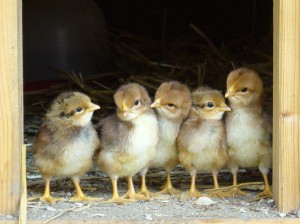
Epigenetics could play an important role in the future of bird breeding and selection methods, according to a new review published in Genetics Selection Evolution today. There is hope that our increasing knowledge of epigenetic influence on development may help the future bird farming industry to meet the growing world food demand. Frésard et al. discuss the existing research into epigenetic mechanisms in birds, and how this may affect development of various economically relevant traits in adult farmed birds. Previous research has confirmed that many different epigenetic phenomena cause phenotypic variation in mammals, and we now learn that many of these mechanisms may also be relevant to birds.
Reciprocal effects, involving different contributions of the sire and dam in the offspring phenotype, are well known in farm birds. Studies have discovered that this phenomenon accounts for 15-20% of phenotypic variability in broiler chicken body weight and egg viability, and up to 47% in turkey egg production. These studies have been used to devise optimised mating schemes. Genomic imprinting may be one of the mechanisms leading to these reciprocal effects and to the detection of parent-of-origin quantitative trait loci. With the advent of new generation sequencing, the authors consider the possibility of providing answers to the question of the existence of genomic imprinting in birds. Another key feature of mammalian imprinting being investigated is DNA methylation patterns. DNA methylation is an epigenetic process which can change the regulation of gene expression. Specific methylation patterns can be inherited across generations in mammals, and studies on how this may affect various genes in birds are ongoing.

The authors review the influence of environmental factors on phenotypic development, such as exposure to toxins, stress or maternal nutrition. Studies show that environmental factors have a broader impact on the adult phenotype when the effects occur early in development. One post-hatch environmental influence is temperature; expression of brain-derived neurotrophic factor (BDNF), a key thermotolerance regulator was found to vary between control birds and birds acclimated to heat early in post-hatch life due to varying epigenetic marks. Bird susceptibility to Salmonella entriditis and Marek disease could be influenced by epigenetic modifications, which opens the door for possible modulation of resistance and susceptibility to specific poultry diseases.
The effect of the environment during development in the egg, including changes to nutrients and hormones, also has a crucial impact on the later adult phenotype. Exposure of poultry embryos to different temperatures during the critical developmental period can enable the birds to adapt to varying climatic conditions in adulthood. Altering the diet of the mother, underfeeding and altering brood size also all result in significant effects on the offspring, likely due to stress-induced epigenetic mechanisms. It has also become apparent that epigenetic marks originating from ancestors’ environment may be transmitted across generations in mammals; however evidence of this happening in birds is yet to be discovered.
Frésard et al. have confirmed that epigenetic factors contribute largely to phenotypic variation in birds, but suggest that much more work must be done in this exciting area of research in order to exploit it for genetic selection. A primary poultry genetics organisation has recently suggested that this research represents a challenge for developing breeding applications.
Jennifer Franklin, Editorial Assistant (Biological Sciences)
Latest posts by Jennifer Franklin (see all)
- New thematic series: Structure and mechanism of nanomotors in the cell - 26th September 2014
- Welcoming Victor Garcia-Martinez to the Associate Editorial team - 4th September 2014
- Transcriptional regulation and disease: a new article collection - 28th August 2014
Comments